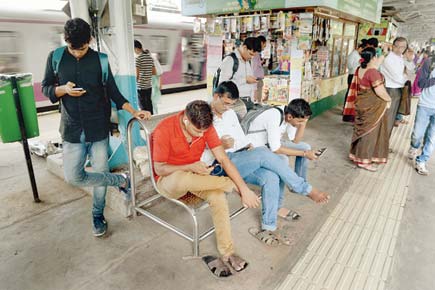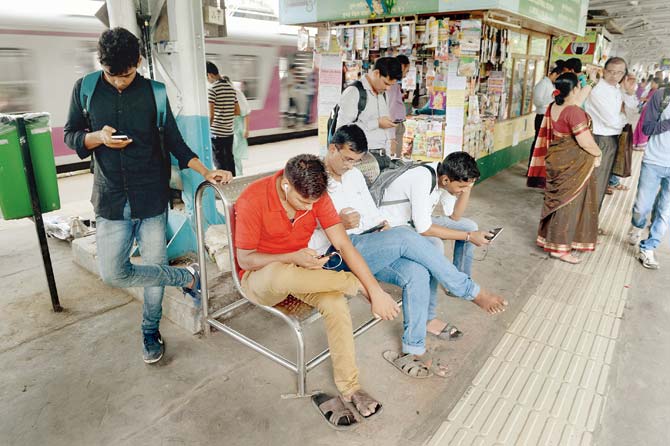The claims of Mumbai being a Smart City makes little difference to citizens who struggle to find signs of basic intelligence in governance


How well do government-funded Wi-Fi zones work after their PR campaigns end?
 I find it absurd that a government would consider coming up with something called a Smart City Mission. This automatically implies the presence of a place managed with some modicum of intelligence. And yet, when was the last time you looked around any part of your city and thought, 'That's an intelligent move by the government'? I think a less lofty objective and name - the Common Sense City Mission, for instance - would be more agreeable, simply because it's something our cities have to aspire to first.
I find it absurd that a government would consider coming up with something called a Smart City Mission. This automatically implies the presence of a place managed with some modicum of intelligence. And yet, when was the last time you looked around any part of your city and thought, 'That's an intelligent move by the government'? I think a less lofty objective and name - the Common Sense City Mission, for instance - would be more agreeable, simply because it's something our cities have to aspire to first.
ADVERTISEMENT
For proof, consider any aspect of governance that impacts your life: How you travel, the building you live in, the garbage disposal facilities in your locality, the quality of healthcare, access to decent education, or recreational opportunities outside the private sector. It's a long list that will yield no signs of intelligence whatsoever, unless you're looking for the devious sort that enables some government employees to become very rich, very quickly.
You don't need to be very smart to understand that the BMC has access to an annual budget that is larger than what some states have. You don't need to be very smart to see that there are very little signs of this money ever making its way towards infrastructure that works for the common good. Interestingly, the BMC recently decided not to be part of the government's Smart City mission anyway. They did this not because they believed they had already created a Smart City for residents (because the opposite is closer to the truth), but because they allegedly wanted to retain complete control of the municipal body.
The BMC wanted a say in the proposal, and one spokesperson went on record to say that Bombay was already a Smart City. This came as a surprise to millions of us, obviously, because we all assumed he was referring to some other city, in a whole other country. He was being serious though, which is frightening because it means there are others like him who believe there is no room for improvement in our city. These are presumably the same people who believe they can turn us into Shanghai within a few months, and that what we really need for a better life is a penguin enclosure at the zoo and a large statue in the sea.
It doesn't take a genius to figure out what can make Bombay a Smart City. It does take education though, which is in short supply if one decides to check the credentials of the men and women who make these decisions for the rest of us. This is probably why we can't figure out how to sort out parking issues, make railway stations as clean as Metro stations, or ensure that public toilets are cleaned every hour, as opposed to every month.
The world looks at the definition of Smart City rather differently. It refers to the 'Internet of things', for instance, where information and technology come together seamlessly to sort out a city's problems and make the lives of its residents easier. Keeping this in mind, consider how seamlessly your current Internet service provider and mobile service operator function. How do their customer service departments treat you?
How well do much-publicised government-funded Wi-Fi zones work a few weeks after their PR campaigns end? Now use this data to try and imagine a city where this happens at a much larger scale, without any hiccups. If you don't see it happening, join the club.
Maybe I'm just an awful cynic, of course. I have only decades of experience with how the government of Maharashtra functions to base these assumption upon. It's why I laugh at published deadlines for infrastructure projects, avoid downloading any so-called apps promoted by the government, and stay away from government websites too, because none of these things mean a thing.
We don't need to be a Smart City. We simply need to be a city that recognises its many problems and works with residents to fix them. We can start with roads that work, more public toilets, better-run hospitals for a change, and work our way up from there. We can rework our priorities and allocate more money to infrastructure than statues that help no one. We can prevent criminals from becoming politicians, if we have the will to do so.
We can cut more red tape, amend outdated laws, and care a little more about the truly marginalised. Even a child would think of these as the truly smart things to do.
When he isn't ranting about all things Mumbai, Lindsay Pereira can be almost sweet. He tweets @lindsaypereira. Send your feedback to mailbag@mid-day.com
 Subscribe today by clicking the link and stay updated with the latest news!" Click here!
Subscribe today by clicking the link and stay updated with the latest news!" Click here!







